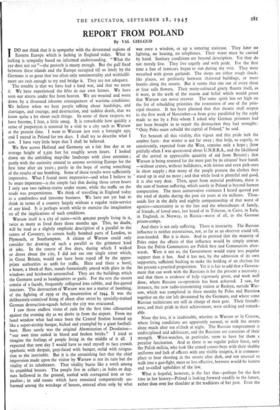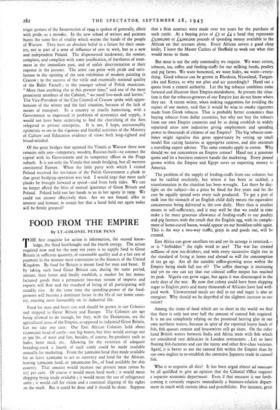REPORT FROM POLAND
By VAL GIELGUD
T DO not think that it is sympathy with the devastated regions of I Eastern Europe which is lacking in England today. What is lacking is sympathy based on informed understanding. " What the eye does not see "—the proverb is musty enough. But the gulf fixed between these islands and the Europe occupied till so lately by the Germans is so great that too often only sentimentality and wishfulfil- ment are rash enough to try and bridge it. They are not adequate.
The trouble is that we have had a hard war, and that we know it. We have experienced the blitz in our own homes. We have seen our streets under fire from heaven. We are wearied and worn down by a thousand irksome consequences of wartime conditions. We believe when we hear people talking about hardships, and shortages, and courage, and destruction, and sudden death, that we know quite a lot about such things. In some of these respects we have become, I fear, a little smug. It is remarkable how quickly a sense of proportion is restored by a visit to a city such as Warsaw at the present time. I went to Warsaw just over a fortnight ago, and I stayed in Poland for ten days. I shall try to describe what I saw. I have very little hope that I shall be believed.
We flew across Holland and Germany on a fair fine day at an average height of 5,500 feet for roughly seven hours. I looked down on the unfolding map-like landscape with close attention ; partly with the curiosity natural to anyone revisiting Europe for the first time after six years ; partly in the hope of seeing something of the results of our bombing. Some of those results were sufficiently impressive. What I found more impressive—and what I believe to be mere important—is the simple fact that during those seven hours I only saw two railway-trains under steam, while the traffic on the roads was proportionate. We think of travelling in England today as a comfortless and tiresome business. We have not yet had to think in terms of a country largely without a regular train-service of any kind. It is perhaps worth while to exercise the imagination on all the implications of such conditions.
Warsaw itself is a city of ruins—with 400,000 people living in it, twice as many as lived there three months ago. This, no doubt, will be read as a slightly emphatic description of a parallel to the centre of Coventry, to certain badly bombed parts of London, to Plymouth, or Southampton. A citizen of Warsaw could only consider the drawing of such a parallel as the grimmest kind of joke. In the course of five days, during which I walked or drove about the city, I did not see one single street which, in Great Britain, would not have been roped off by the appro- priate authorities as unfit for traffic. Here and there a hotel, a house, a block of flats, stands fantastically unreal with glass in the windows and brickwork unscorched. They are the buildings which the Germans used as headquarters or gaols. For the rest the streets consist of a facade, frequently collapsed into rubble, and fire-gutted interiors. The destruction of Warsaw was not a matter of bombing, of the fighting of 5939 or thc insurrection of 1944. It was the deliberately-contrived firing of street after street by specially-trained German destruction-squads before the city was evacuated.
I saw those endless vistas of ruin for the first time silhouetted against the evening sky as we dro'v'e in from the airport. From my hotel window what had once been the Central Station loomed up like a super-airship hangar, kicked and crumpled by a giant football- boot. Here surely was the original Abomination of Desolation— "our own time ended in blood and broken bricks." I tried to imagine the feelings of people living in the middle of it all. I expected that next day I would have to steel myself to face crowds apathetic with despair, grey-faced with hunger, stolid with resigna- tion to the inevitable. But it is the astonishing fact that the chief impression made upon the visitor by Warsaw is not its ruin but the vitality of its inhabitants. That vitality burns like a torch among its crumbled houses. The people live in cellars ; in holes or dug- outs hollowed in. the ground, roofed with corrugated iron or tar- paulins ; in odd rooms which have remained comparatively un- harmed among the wreckage of houses, entered often only by what
was once a window, or up a tottering staircase. They have no lighting, no heating, no telephones. Their water must be carried by hand. Sanitary conditions are beyond description. Yet they do not merely live. They live eagerly and with pride. For the first time a line of tramcars began to run during my visit. They were wreathed with green garlands. The shops are either rough shack- like places, set perilously between shattered buildings, or mere booths along the streets. But it seems that one out of every three or four sells flowers. Their many-coloured gaiety flaunts itself, as it were, in the teeth of the reason and belief which would groan that Warsaw can never recover. The same spirit has set high on the list of rebuilding priorities the restoration of one of the prin- cipal theatres. It has been planned that that theatre shall reopen in the first week of November—a beau geste paralleled by the reply made to me by a Pole whom I asked why German prisoners had not been brought in to repair the destruction they had wrought: ".Only Poles must rebuild the capital of Poland," he said.
Yet beneath all this vitality, this vigour and this pride lurk the sombre facts : that winter is not far away ; that help, so eagerly, so consistently, expected from the West, remains only a hope ; (how pitifully often I was questioned about U.N.R.RA., and the likelihood of the arrival in appreciable quantity of aid from Britain) ; that Warsaw is being restored for the most part by its citizens' bare hands —without cranes, without bulldozers, with lorries and even pick-axes in short supply ; that many of the people possess the clothes they stand up in and no more ; and that while food is plentiful and good, it is also very dear. Then, apart from material problems, there is the sum of human suffering, which surely in Poland is beyond human computation. The most conservative estimates I heard quoted put the total of deaths during the past six years at six millions. Thou- sands live in the daily and nightly companionship of that worst of agonies—uncertainty as to the fate and the whereabouts of family, of friends, of loved ones, last heard of in Teheran, in Cairo, in Italy, in England, in Norway, in Russia—worst of all, in the German prison-camps.
And there is not only suffering. There is insecurity. The Russian influence is neither ostentatious, nor, as far as an observer could tell, iron-handed. But it is there. And to pretend that the majority of Poles enjoy the effects of that influence would be simply untrue. Even the Polish Communists are Polish first and Communists after- wards. Were it not so, the Government would enjoy less popular support than it has. And it has not, by the admission of its own supporters, sufficient backing to make the holding of an election for the present a practical proposition. Yet it is fair to add that a Govern- ment that can work with the Russians is for the present a necessity ; and that there is evidence of help vigorously given, and work well done, where Russian co-operation has been achieved. I saw, for instance, the new radio-transmitting station at Rashyn, outside War- saw, which was completed in three months by Poles and Russians together on the site left devastated by the Germans, and where some Russian technicians are still in charge of their gear. Their friendli- ness, and their pride in their achievement, were striking and remark- able.
None the less, it is inadvisable, whether in Warsaw or In Cracow, where living conditions are apparently normal, to walk the streets alone much after ten o'clock at night. The Russian temperament is undisciplined and adolescent, and the Russians are conscious of their strength. Wrist-watches, in particular, seem to have for them a peculiar fascination. And as there is no regular police force, only the Polish militia, who look like armed corner-boys with their shabby uniforms and lack of officers with any visible insignia, it is common- place to hear shooting in the streets after dark, and not unusual to walk into a gun-fight, more or less effective, between would-be looters and so-called upholders of the law.
What is hopeful, however, is the fact that—perhaps for the first time in her history—Poland is looking forward steadily to the future, rather than over her shoulder at the traditions of her past. Even the
tragic gesture of the Insurrection of 1944 is spoken of generally, albeit with pride, as a mistake. In the new school of writers and painters burns the same fire of vitality which warms the hands of the people of Warsaw. They have an absolute belief in a future for their coun- try, not as part of a zone of influence of east or west, but as a new and independent Poland. The dispossessed landowner, the reiter, complain, and complain with some justification, of harshness of treat- ment in the immediate past, and of unfair discrimination at their expense in the present. The artist can point with pride and satis- faction to the opening of the new exhibition of modern painting in Cracow ; to the success of the virile and essentially national quality of the Ballet Parnell ; to the younger school of Polish musicians. " More than anything else at this present times" said one of the most prominent members of the Cabinet, " we need live-stock and lorries." The Vice-President of the City Council of Cracow spoke with appre- hension of the winter and the fuel situation, because of the lack of means of transport. In a country so cruelly hamstrung, with a Government so engrossed in problems of economics and supply, it would not have been surprising to find the cherishing of the Arts relegated to private enterprise. It is not, I hope, unreasonably optimistic to see in the vigorous and fruitful activities of the Ministry of Culture and Education evidence of views both long-sighted and broad-minded.
Of the great bridges that spanned the Vistula at Warsaw there now remains only one—temporary, wooden, Russian-built--to connect the capital with its Government and its temporary offices in the Praga suburb. It is not only the Vistula that needs bridging, but all western continental Europe. When the little party with which I visited Poland received the invitation of the Polish Government a plank in that great bridging-operation was laid. I would urge that more such' planks be brought forward at speed—and from both sides. We can no longer afford the bliss of mutual ignorance of Great Britain and Poland. Poland held out her hands to us in her agony in 1939. We could not answer effectively then. Are we not bound, alike in interest and honour, to assure her that a hand held out again today will be firmly grasped?



























 Previous page
Previous page